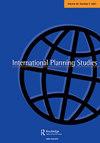城市土地的多重利益:坎帕拉灾难引发的土地安置政治
IF 1.5
Q4 REGIONAL & URBAN PLANNING
引用次数: 5
摘要
摘要许多地方当局为减少非正规住区遭受灾害风险和气候变化影响而采取的行动之一是将人们从高风险地区转移出去。这通常是通过重新安置、重新安置或驱逐来实施的。本文认为,地方当局承认并确认土地的多重利益,为城市公平应对风险和适应气候变化提供了创新优势。更具体地说,我们关注坎帕拉土地的多重利益如何在努力减少灾害风险的背景下影响与重新安置人员相关的过程。在这种情况下,寻求重新安置的当局更倾向于谈判,而不是强制重新安置,这些谈判为出现更公平的结果开辟了可能性,例如留在现有社区。坎帕拉当局的经验为其他面临重新安置挑战的城市提供了教训。本文章由计算机程序翻译,如有差异,请以英文原文为准。
Multiple interests in urban land: disaster-induced land resettlement politics in Kampala
ABSTRACT One of the actions that many local authorities take in to reduce exposure of informal settlements to disaster risks and the impacts of climate change is to move people out of high-risk areas. This is usually enacted through resettlement, relocation or evictions. This article argues that local authorities recognizing and validating multiple interests in land offers an innovative advantage to cities in equitably responding to risks, and adapting to climate change. More specifically, we focus on how multiple interests in land in Kampala influenced processes associated with the resettlement of people within the context of trying to reduce exposure to disaster risks. In this instance, authorities seeking to resettle people were more inclined to negotiate than impose resettlement and these negotiations opened up the possibilities for more equitable outcomes to emerge, such as staying in their existing communities. The experience of Kampala’s authorities offers lessons for other cities confronting resettlement challenges.
求助全文
通过发布文献求助,成功后即可免费获取论文全文。
去求助
来源期刊

International Planning Studies
REGIONAL & URBAN PLANNING-
CiteScore
4.60
自引率
4.80%
发文量
20
期刊介绍:
Planning, at urban, regional, national and international levels, faces new challenges, notably those related to the growth of globalisation as both an objective socio-economic process and a shift in policy-maker perceptions and modes of analysis. International Planning Studies (IPS) addresses these issues by publishing quality research in a variety of specific fields and from a range of theoretical and normative perspectives, which helps improve understanding of the actual and potential role of planning and planners in this context.
 求助内容:
求助内容: 应助结果提醒方式:
应助结果提醒方式:


